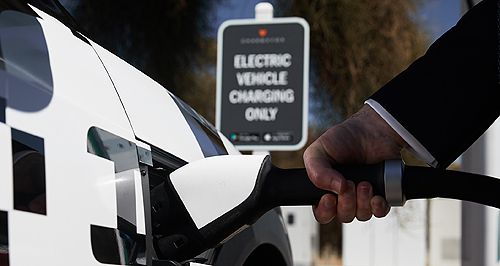News - General News - Electric VehiclesEV network not changing rollout plans for partnersPartnering car-makers say Chargefox network will not change EV rollout plans26 Oct 2018 CAR manufacturers backing the new Chargefox electric vehicle (EV) fast-charging network say they would have still continued with their own respective electric vehicle rollouts even if the network was not being built.
Executives from several car-makers have previously stated that mass-market EV take-up in Australia would not be possible without help from governments and improved charging infrastructure.
So far four car-makers are backing the initiative – Jaguar Land Rover, Mercedes-Benz, Hyundai and Audi – none of which are altering their EV rollout plans in the wake of the charging network establishment.
Speaking to GoAuto at the official unveiling of the Chargefox network in Euroa, Mercedes-Benz Cars Australia/Pacific head of media relations and product communications Jerry Stamoulis said the company would not change its plans to launch EVs in Australia, but the network may help convince its head office in Germany to offer a higher volume of EVs Down Under.
“We’re confident in our planning regardless of what infrastructure is guaranteed, but this certainly helps our argument with Stuttgart to be able to say the infrastructure is there, the acceptance of the vehicles is high, and maybe helps us fight for more volume,” he said.
He added that the Chargefox network would not bring forward any future product plans and that the brand was looking to bring every available EV to Australia regardless.
The German car-maker has previously said that mass-market EV adoption cannot happen without public sector support and in the past has called on the government to assist in the building of EV infrastructure and introduction of incentives.
Audi Australia product planning and pricing director Shawn Ticehurst said the infrastructure would support the company’s EV rollout rather than change it, given that most owners would use their EV for smaller daily commutes instead of long-distance travel.
Jaguar Land Rover (JLR) Australia managing director Mark Cameron agreed that the majority of EV owners will rarely need to use interstate charging networks, however such infrastructure was still vital for EVs to be taken seriously in Australia.
“I think infrastructure like this being put in place and having 25 similar stations within 12 months from now to connect all the major cities can only be a good thing,” Mr Cameron said.
Mr Cameron anticipated that the majority of EV owners will live in urban areas and on average will commute less than 30km per day, however the Chargefox network will help remove doubts from buyers’ minds.
“What this does though is take away those perceptions of ‘occasionally I have my longer trips, will I be able to travel interstate between major cities?’ This type of installation takes away all that concern.
“Sometimes you need catalysts and things to start. It actually takes action to kick-start things and people to say, ‘it’s actually not just a plan, it’s real’.
“And the cameras here and the reporting going on showing there is actually a solar array here … that’s a game changer and it’s no longer a conversation of it being hypothetical, it’s real life. And I hope that other states and other private enterprises will look at this and think, ‘actually, we need to do something as well.’”
Mr Cameron also said the installation of highway fast-charging stations could lead to greater EV take-up for regional buyers, who would typically drive longer distances at more regular intervals than urban customers.
Jaguar’s first EV, the I-Pace crossover, is set to arrive in Australia this year, while the car-maker plans to electrify all of its model lines by 2020.
Jet Charge CEO and Chargefox head of EV strategy Tim Washington said that Chargefox would not be finished once the nationwide rollout is complete, but would continue to implement charging stations around Australia.
He said the goal was to cover popular tourism sites around Australia that would attract traffic from residents and holidaymakers alike.
“We are already planning our phase-two rollout,” he said. “We’ve basically sent out expressions of interest to landowners who want to come to us, and we basically want all of the tourism sites covered as well. So we want that true freedom for anyone that wants to drive where they want to go in an electric vehicle.”
Mr Washington did not yet have a timeframe or score for the second phase of the rollout, saying that a more extensive expansion would be dependent on the popularity of EVs in Australia.
“We think just like a build-out for any infrastructure or refuelling, it will depend on demand. But we do want to cover the country.”  Read more |
Click to shareGeneral News articlesResearch General News Motor industry news |

















Facebook Twitter Instagram